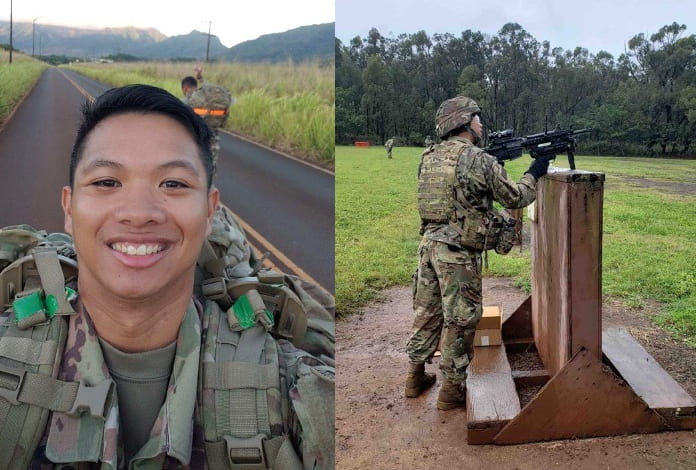As cadets in the ROTC program, it is often difficult to understand how the training we receive during our time as students will impact our jobs in the Army. Because of this challenge, it is important to reach out to past cadets who have been in our shoes and have been successful after commissioning. A great role model both inside and outside of ROTC is former cadet and current First Lieutenant Joe Christopher Nobleza. As an alum from UCI, his experiences and achievements in and out of ROTC are crucial to the program’s success.
First Lieutenant (1LT) Nobleza commissioned as a Signal Corps Officer in June of 2019. Signal Corps was 1LT Nobleza’s first choice, among the other branches. After commissioning, he attended Basic Officer Leaders Course (BOLC) in Fort Gordon, Georgia, where it felt familiar to the ROTC program. First Lieutenant Nobleza claimed that the positive environment seemed “like an extension of college and ROTC,” but with more of a focus on the military and specifically Signal Corps. During BOLC, 1LT Nobleza learned skills specific to his branch, such as Inform Signal Theory, Information Technology and Signal Core, Tactical Network (TN), Network Operations, Combat Net Radio (CNR), Cloud, Maneuver Control System (MCS), Blue Force Tracker (BFT), Command Post of the Future (CPOF), Tactical Operations Center Network (TOCNET), Command Post Platform (CPP), Operations, and Digital Tactical Operation Center. During his time in Georgia, and before COVID-19 hit, he enjoyed archery, shooting, and bass fishing, which were very popular in the area.
1LT Nobleza is currently stationed in Schofield Barracks, in O’ahu, Hawaii and works as the Company Executive Officer. His typical day as an Executive Officer includes physical training at 0630, meetings throughout the day, planning training, and mentoring two new Platoon Leaders in his Company. 1LT Nobleza describes every day as a new challenge, with different obstacles to overcome. An example of one obstacle is if a generator or Humvee goes down, 1LT Nobleza will work with the maintenance Non-Commissioned Officer (NCO) in order to get a mechanic to fix those parts. A Non-Commissioned Officer is a senior enlisted member who is commonly referred to as the “backbone of the army.” NCO’s are known to execute the tasks that the commissioned officers plan and resource. Other responsibilities include supporting the Brigade, whether it is through retransmission operations or maintaining communications and equipment. Retransmission is when an arrangement of two radios connected to provide automatic retransmission of signals between two other radios that are too far apart to communicate directly with each other. Each day brings new challenges that First Lieutenant Nobleza must face, but he utilizes the skills learned from both ROTC and after commissioning to tackle these obstacles.
As a First Lieutenant, reflection upon past experiences is key to moving toward success. 1LT Nobleza reflected on the most difficult moment after ROTC and explained how he was able to overcome that obstacle. “The most difficult moment so far [was] assuming the position of Executive Officer because you don’t know what to expect.” He explained that coming into the position of a Platoon Leader and then being moved to a harder position was a big transition. According to 1LT Nobleza, “It’s an interesting challenge, because I have to focus on the bigger picture; how the company runs, and [if it] is successful in all of its missions.”
To overcome the challenges as an Executive Officer, First Lieutenant Nobleza suggests reaching out for help when you feel overwhelmed or do not understand a certain job. He says, “If you know you’re not proficient in something or need help, that’s when you need to reach out.” He personally overcame the challenge of learning how to use specific Army systems that related to his job by reaching out to the Staff Sergeant who taught him how to use the mechanical system. 1LT Nobleza ensured that reaching out for help is a great way to overcome obstacles when it seems impossible.
Finally, 1LT Nobleza offered advice to cadets who are currently in the program. He described that the best advice is to not be “intimidated by not knowing.” He emphasized the importance of finding a mentor at the first duty station, as well as battle buddies to help in times of need. He also stressed the importance of putting in the effort and doing everything to your highest ability. He also explained that, in order to be successful in the future, building a strong foundation is where it starts. 1LT Nobleza noted that the UCI Army ROTC prepared him for life as an active duty officer by giving him a good foundation for leadership and teaching him the basic soldiering skills he needed to know before he commissioned as an officer.
As cadets, it is important for us to reach out to UCI ROTC graduates to ask for advice and hear about their experiences. As officers in the Army, each experience will be different. However, we can learn from those differing experiences to guide our path to success.

